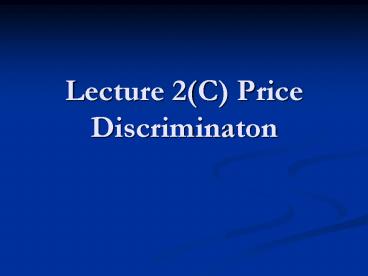Lecture 2(C) Price Discriminaton - PowerPoint PPT Presentation
1 / 12
Title:
Lecture 2(C) Price Discriminaton
Description:
To reduce the lost revenue that would result if the ... Expensive differentiation (Escalades v Suburban sx v dx chips) ... Have some degree of market power. ... – PowerPoint PPT presentation
Number of Views:13
Avg rating:3.0/5.0
Title: Lecture 2(C) Price Discriminaton
1
Lecture 2(C) Price Discriminaton
2
Price Discrimination The Easy Questions
- What is it?
- Charging Different Prices for the Same Good
- Why do firms do it?
- To reduce the lost revenue that would result if
the price cut was offered to the customers who
were willing to pay the higher price. - Who gets discriminated against?
- Those customers willing to pay the higher price
(i.e., the low elasticity buyers
3
The Hard Question Why Do Firms Discriminate in
Ways That are Seemingly Counter to Other
Interests?
- Airline Pricing Lower prices to weekend
travelers. - Entrance fees
- Coupons
- Expensive differentiation (Escalades v Suburban
sx v dx chips)?
4
To Be a Successful Price Discriminator, The Firm
Should
- Have some degree of market power.
- Be able to segregate customers according to
willingness to pay. - Be able to prevent arbitrage.
5
Perfect Discrimination and Consumer Surplus
- Consumer Surplus The difference between what
youre willing to pay and what you have to pay. - Price discrimination can be thought of as an
attempt to extract more of the consumer surplus
6
An Example
Quantity Price (What Youd be Willing to Spend for the Next Unit Total Value (What Youd be Willing to Spend for the Total Q
1 5 5
2 4 549
3 3 9312
4 2 12214
Spending 3x39, and so what is the surplus?
If P3, how many would you buy?
Q3, and so what would you spend?
Surplus12-93
7
Consumer Surplus and Optimal 2-Part Pricing
- A 2-part pricing scheme is one where the
customer must pay a fixed fee (entrance fee)
for the right to buy the good at some price. - Club charge at Sams
- Cover charge at a nightclub
- Connect fee for electricity
- In class well build a model of 2-part pricing
and show that the optimal scheme is one where - The good is sold at marginal cost
- The entrance fee is set at a level such that the
customer pays over the entire consumer surplus.
8
- If you understand what is meant by consumer
surplus, you understand that the ideal scheme of
discrimination (ideal from the point of the
seller) is to engage extract all possible
surplus. - This is often what salesmanship is all about.
- It also explains why take-it-or-leave-it may be
an effective strategy. - Interestingly, in cases of bilateral monopoly
(both sides can only deal with the other) or near
bilateral monopoly, the entire negotiation is
about surplus and small differences in bargaining
power make for big differences in outcomes. - (Why did the dominant pitcher of the 1960s,Bob
Gibson, never make more than 150 k, while Roger
Clements makes almost 20 million?)
9
Bundling and Price Discrimination
- Bundling is the requirement that a customer buy
a fixed basket of the goods, rather than buy only
what is wanted. - In some cases, this is just to eliminate the cost
of negotiating over every detail - But in other cases, this would seem counter
productiveafter all, in most markets, the firms
interests are best served by giving the customer
what they want.
10
An Example Suppose the following represents the
maximum amount each movie theater would pay for
each movie
Movie Movie
Biker Bingo Barney
Theater HP 6 10
Frat Row 10 6
11
- If the producer could discriminate, TR 32
- But what if the producer doesnt know the local
market - Charging 10 per movie yields only 20
- Charging 6 per movie yields only 24
- Charging 16 for the bundle yields 32
12
Is Price Discrimination Ethical?































